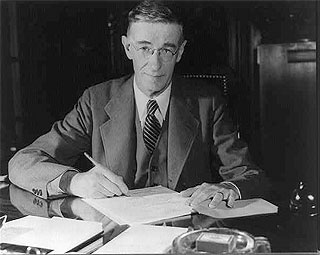How Polaroid Failed to Introduce the Kindle in the Mid-1940s
Vannevar Bush (1890-1974) is justly famous for his 1945 Atlantic essay “As We May Think.” It proposes a device called a memex which bears an uncanny resemblance to a personal computer connected to the World Wide Web–or at least as close as anyone could come five decades before the Web changed the world.
As described in the Atlantic article, the memex was the size of a desk. But Bush also had an idea for a portable microfilm reader–which sounds like it would have been to the Kindle as the memex was to the PC–and tried to convince Edwin Land, cofounder of Polaroid, to help him build it. That’s one of the innumerable interesting things about Polaroid which I learned but couldn’t fit into my story “Polaroid’s SX-70: The Art and Science of the Nearly Impossible.”
All I know about this project-that-wasn’t is in a couple of tantalizing paragraphs in Victor McElheny’s excellent Edwin Land: Insisting on the Impossible. It comes up when the author is discussing some early instant-photography portraits that Land took of people he knew in 1947:
Another portrait was of Vannevar Bush, who had wryly forecast one-step photography in his 1945 article, As We May Think,” and was now corresponding with Land about a lightweight, small microfilm reader what would handle like a book. Bush was deeply interested in easing the retrieval of the vast and swelling stores of information in the books and periodicals of libraries. A pioneer in analog computing, Bush lamented “a growing mountain of research” in a time when specialization was required for progress and yet was catching researchers in a bog. He foresaw “cheap complex devices of great reliability” to organize information, and make it easy to find and display. Fascinating generations of computer scientists, his proposed “memex” foreshadowed the personal computers of the 1970s and later.
Bush wrote to Land about his idea, even though he knew of Land’s all-consuming preoccupation with one-step photography: “I would be rather fearful of relying on great established organizations in this general field in conjunction with an innovation that is as unorthodox as this one.” The two met to discuss the Fresnel lens of the proposed microfilm reader and its applications, and corresponded about it for at least two years, but a commercial system did not result.
I can’t find other mention of Bush’s lightweight reader on the Web, and it doesn’t seem to be discussed in this Bush biography. But if Bush and Land discussed it for two years, I hope the correspondence survives, as McElheny seems to suggest. It sure is tantalizing, and it’s fun to wonder what might have transpired if Polaroid had introduced a breakthrough information-consumption gadget in the 1940s. The whole thing reminds me of another unconsummated brainstorm I’ve covered here: Thomas Edison’s 40,000-page books printed on metal.
Comments are closed
Read more:














By Harry McCracken | Monday, June 13, 2011 at 12:12 am